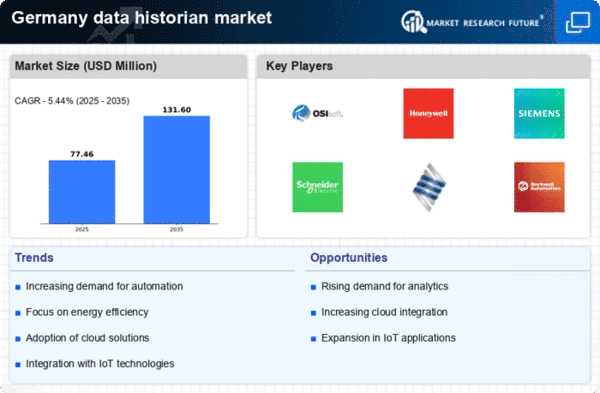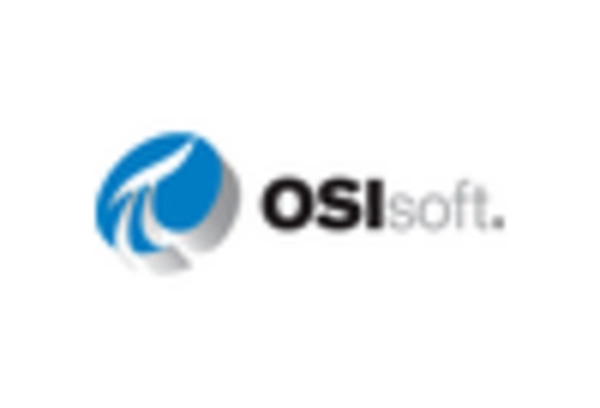Focus on Enhanced Data Interoperability
In the context of the data historian market, enhanced data interoperability is becoming a critical driver in Germany. As organizations utilize diverse data sources and systems, the ability to integrate and share data across platforms is essential for effective decision-making. The demand for interoperability solutions is expected to rise, with estimates suggesting a growth rate of around 12% annually. This trend is particularly relevant in sectors such as manufacturing and utilities, where data from various sensors and devices must be harmonized for optimal performance. Consequently, the data historian market is evolving to provide solutions that facilitate seamless data exchange and integration, thereby supporting organizations in achieving a more cohesive data ecosystem.
Growing Adoption of Cloud-Based Solutions
The shift towards cloud-based solutions is reshaping the data historian market in Germany. Organizations are increasingly recognizing the benefits of cloud technology, including scalability, cost-effectiveness, and enhanced collaboration. Recent surveys indicate that over 60% of German companies are planning to migrate their data management systems to the cloud within the next two years. This transition is likely to drive demand for cloud-compatible data historian solutions that can seamlessly integrate with existing cloud infrastructures. As businesses seek to optimize their data storage and processing capabilities, the data historian market is adapting to offer innovative cloud-based solutions that cater to these evolving needs. The potential for improved data accessibility and real-time analytics in cloud environments may further accelerate this trend.
Regulatory Compliance and Data Governance
The data historian market in Germany is increasingly influenced by stringent regulatory compliance requirements and data governance standards. Industries such as pharmaceuticals, finance, and energy are subject to rigorous regulations that mandate accurate data recording and reporting. As a result, organizations are turning to data historian solutions to ensure compliance with laws such as the General Data Protection Regulation (GDPR) and industry-specific standards. The market for compliance-related data management solutions is expected to grow by approximately 20% in the coming years. This trend underscores the importance of robust data governance frameworks within the data historian market, as companies seek to mitigate risks associated with non-compliance and enhance their data integrity.
Rising Demand for Real-Time Data Analysis
The data historian market in Germany is experiencing a notable surge in demand for real-time data analysis capabilities. Industries such as manufacturing, energy, and transportation are increasingly relying on real-time insights to enhance operational efficiency and decision-making processes. According to recent statistics, the market for real-time data analytics is projected to grow at a CAGR of approximately 15% over the next five years. This trend is driven by the need for organizations to respond swiftly to market changes and operational challenges. As a result, the data historian market is adapting to provide solutions that facilitate immediate data access and analysis, thereby supporting the evolving needs of various sectors. The integration of advanced analytics tools within data historian systems is likely to further bolster this demand, positioning the industry for sustained growth.
Increased Investment in Digital Transformation
In Germany, the ongoing digital transformation across various sectors is significantly impacting the data historian market. Organizations are investing heavily in digital technologies to streamline operations and improve data management practices. Reports indicate that companies are allocating upwards of €10 billion annually towards digital transformation initiatives. This investment is fostering the adoption of data historian solutions that can effectively manage and analyze large volumes of data generated by modern technologies. As businesses seek to leverage data for competitive advantage, the data historian market is poised to benefit from this trend. The emphasis on integrating data historian systems with existing IT infrastructure is likely to enhance data accessibility and usability, thereby driving further growth in the industry.
















